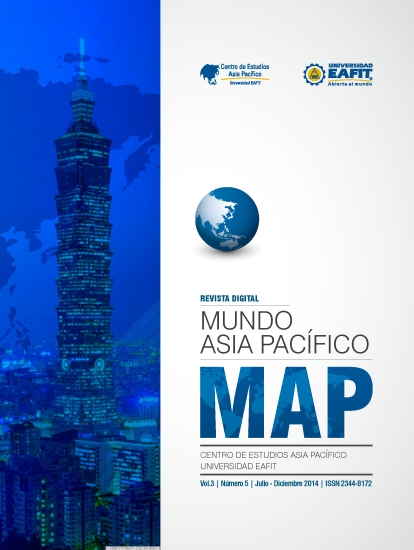Budismo ambiental, budismo comprometido: una mirada al movimiento budista ambiental tailandés
Main Article Content
Keywords
Budismo comprometido, budismo tailandés, budismo ambiental, budismo ético, desarrollo económico, movimiento social, activismo, ambientalismo.
Resumen
La sociedad tailandesa vive una crisis ambiental que se manifiesta en la rápida degradación de sus recursos naturales, principalmente ocasionada por las dinámicas de explotación. Ante esta situación, los monjes budistas se han manifestado de diferentes formas adquiriendo un compromiso social, político y ambiental, en aras de buscar soluciones a la crisis ambiental. Una de las manifestaciones ha sido la creación del Movimiento Budista Ambiental Tailandés, el cual se basa en los principios budistas para realizar acciones que contribuyan a la protección y conservación del medio ambiente. El objetivo de este artículo es explorar el papel de dicho movimiento en Tailandia, con base en el “Budismo Comprometido” y el “Budismo Ambiental”, que son las corrientes de pensamiento que permiten el surgimiento del movimiento y su actual existencia. Esto permitirá explicar la relación entre el budismo y el medio ambiente, para poder así contribuir al debate sobre la unión de estos dos aspectos y su impacto en la actualidad.
Descargas
Referencias
________________ (2003) “Buddhism and Development: The Ecology Monks of Thailand.” From Christopher Queen, Charles Prebish and Damien Keown (eds.) Action Dharma: New Studies in Engaged Buddhism. London: Routledge Curzon.
_______________ (2012) The Ordination of a Tree: The Thai Buddhist Environmental Movement.Albany: State University of New York Press.
Delcore, Henry (2004) “Symbolic politics or generification? The ambivalent implications of tree ordinations in the Thai environmental movement.” Journal of political Ecology 11: 1-30.
Isager, Lotte y Ivarsson, Soren (2002) “Contesting Landscapes in Thailand: Tree Ordination as Counter-territorialization.” Critical Asian Studies 34 (3): 395-417.
Ito, Tomomi (2012) “Dhammic Socialism and Engaged Buddhism: Development of Social Aspects in Thai Buddhism.” En Modern Thai Buddhism and Buddhadasa Bhikkhu: a social history. Singapore: NUS Press.
King, Sallie (2009) “Introduction” y “Ecology.” En Socially Engaged Buddhism. Honolulu: University of Hawai’i Press.
Kornfield, Caroline (2007) “Ordaining Trees in Thailand: Engaged Buddhists Come Together to Save the Forest.” PeacePower: Berkeley ́s Journal of Nonviolence y Conflict Transformation 3 (2): 12-13.
Morrow, Avery (2011) “Tree Ordination as Invented Tradition.” ASIANetwork Exchange 19 (1): 53-60.
Panya, Opart y Sirisai, Solot (2003) “Environmental Consciousness in Thailand: Contesting Maps of Eco-Conscious Minds.” Southeast Asian Studies 41 (1): 59-75.
Payulpitack, Suchira (1992) “Changing Provinces of Concern: A Case-Study of the Social Impact of the Buddhadasa Movement.” Sojourn: Journal of Social Issues in Southeast Asia 7 (1):39-68.
Queen, Christopher y King, Sallie, eds (1996) “Introduction: The shapes and sources of Engaged Buddhism.” En Engaged Buddhism: Buddhist Liberation Movements in Asia. Albany.
Rajadhon, Phya (1988) Essays on Thai Folklore. Thai Inter-Religious Commission for Development and Sathirakoses Nagapradipa Foundation. Bangkok.
Reynolds, Frank (1977) “Civic Religion and National Community in Thailand.” Journal of Asian Studies 36 (2):267-82.
Sivaraksa, Sulak (1992) “Personal and societal transformation.” En Seeds of peace: A Buddhist vision for renewing society. Ed. Tom Ginsburg. Berkeley: Parallax Press
Sivaraksa, Sulak (1998) “Sustainable communities: A Thai Buddhist perspective.” India International Centre Quarterly 25 (2/3): 6-19.
Sponsel, Leslie y Natadecha-Sponsel, Poranee (2001) “Why a Tree Is More Than a Tree: Reflections on the Spiritual Ecology of Sacred Trees in Thailand,” en Santi Pracha Dhamma: Essays in Honour of the Late Puey Ungphakorn, ed. Puey Ungphakorn. Bangkok: Santi Pracha Dhamma Institute.
Swearer, Donald (1991) “Sulak Sivaraksa’s buddhist vision for renewing society.” Crossroads: An Interdisciplinary Journal of Southeast Asian Studies 6 (2):17-57.
Tannenbaum, Nicola (2000) “Protest, tree ordination, and the changing context of political ritual.” Ethnology 39 (2): 109-127.
Taylor, James L (1991) “Living on the Rim: Ecology and Forest Monks in Northeast Thailand.” Journal of Social Issues in Southeast Asia 6: 106-125

